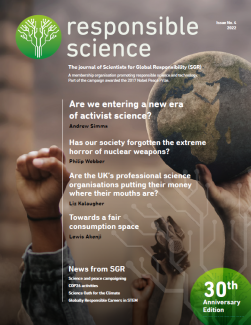Responsible Science is SGR’s journal in which we explore some of the biggest ethical challenges facing science and technology today. It comes with membership of SGR and keeps you up-to-date with what we’re doing as an independent, membership organisation made up of hundreds of natural scientists, social scientists, engineers and people who are simply interested. Contents include in-depth feature articles, reviews, and news on SGR's activities.
April 2022
Download pdf of whole edition [3.4MB]
To order a printed copy, please contact us
In issue no.4...
Feature articles
- Has our society forgotten the extreme horror of nuclear weapons?
With the Russian invasion of Ukraine, the risk of nuclear war has markedly increased. But, as Dr Philip Webber, SGR, points out, the threat comes from all nuclear weapons, not just those in Russian hands. - A new era of activist science
Andrew Simms, SGR, looks at whether scientists can be activists too, and finds that far from being anything new, many of history’s household-name scientists have for generations been getting involved in the moral campaigns of their day. - Activist scientists
Far from being exceptions, leading scientists across a huge range of history and different disciplines have combined often worldchanging research with high profile activism, reports Andrew Simms, SGR. - Encouraging a culture of climate activism in universities
Dr Emily Heath, SGR, shares some tips based on her experience of leading and supporting sustainability campaigns within the UK higher education sector. - The Science Museum sullies its reputation by supporting major polluters
Jess Worth and Dr Chris Garrard, Culture Unstained, report on how the Science Museum is doubling down in defence of its fossil fuel sponsors and alienating scientists, young people and its own, now former, board members in the process. - Are the UK’s professional science organisations putting their money where their mouths are?
Dr Liz Kalaugher details progress on SGR’s latest investigation into the financial links between professional bodies and the fossil fuel and arms industries. - Scientists’ warnings and adequate response
What would it take for humanity to hear and act on the scientists’ warnings of a climate and nature emergency? Dr Alan Cottey discusses ‘adequate response’ and how to achieve it. He recommends empathic dialogue with the ‘hard-to-reach’. - Towards a Fair Consumption Space: Putting people and equity at the centre of the climate discussion
Dr Lewis Akenji, Dana Vigran and Magnus Bengtsson, Hot or Cool Institute, outline their latest research on sustainable lifestyles. - 30 Years of SGR
A brief history of SGR - The mirage of zero-emissions flying
Finlay Asher, Safe Landing, assesses the technical obstacles to the decarbonisation of aviation. - The inclusive, sustainable international conference
How do we reconcile the benefits of scientific gatherings with tackling the climate emergency? Richard Parncutt, University of Graz, has trialled a potential solution. - Militarising research: The dark side of Global Britain’s science agenda
The British government wants the nation to be a ‘science superpower’ – but, asks Dr Stuart Parkinson, SGR, is this just a smokescreen to hide the expansion of military and economic priorities within the science and technology sectors? - Is the University of Edinburgh involved in research for autonomous weapons?
Partnerships between the military and UK academia are being rapidly expanded. Alba Andrés Sánchez
examines whether some of them might be used to help develop lethal autonomous weapon systems (LAWS). - To scare or not to scare? Is a message of fear more effective than a message of hope?
Dr Jan Maskell, SGR, summarises the academic evidence on one of the key debates in climate communication. - Solving the UK’s energy crisis: Heat pumps and insulation for peace?
Even before the Russian invasion of Ukraine, the UK’s home energy bills were shooting up, catapulting millions more into fuel poverty. But there are solutions which tackle this poverty, reduce carbon emissions, and in the longer-term insulate us from some conflicts, argues Dr Philip Webber, SGR. - How the UK can learn from countries climbing out of gas dependence
In light of UK energy policy failings, Andrew Simms and Freddie Daley from the Rapid Transition Alliance look at where, even before the rapid shift in EU energy policy triggered by Russia’s invasion of Ukraine, huge leaps were being made in other countries’ transition away from dependence on polluting gas. - Natural carbon sinks: not just trees
Dr Wiebina Heesterman summarises the importance of the natural carbon sinks that are often overlooked – such as seagrass and soil.
News from SGR
- Editorial
- Science and peace campaigning
- COP26 activities
- Science Oath for the Climate
- Globally Responsible Careers in STEM
- Science4Society Week 2022
- One Planet One Life: school workshops
- SGR Anniversaries
- New project to reduce food waste
- New National Co-ordinating Committee and staff
Event review
